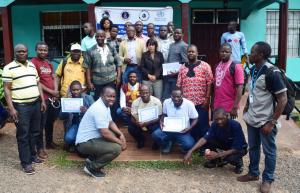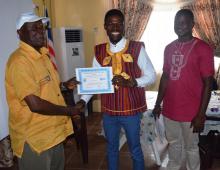First Water Safety Plan for Buchanan Validated by the National Public Health Institute of Liberia (NPHIL), Liberia Water and Sewer Corporation (LWSC) and Partners
Buchanan, 20th July 2018: The first water safety plan for the Buchanan water treatment and supply system was validated at a one day workshop in Buchanan City, Grand Bassa County. The workshop was supported by the World Health Organization (WHO) and attended by professionals from the Ministries of Health, Public Works, Lands, Mines and Energy, National Public Health Institute of Liberia (NPHIL), Liberia Water and Sewer Corporation, World Health Organization (WHO), the Environmental Protection Agency (EPA), OXFAM, Liberia Water Producers Association, the National Standard Laboratory of Liberia (NSL), Civil Society Organizations and members of the media.
The Water Safety Plan was developed to ensure the continuous provision of safe drinking water to the county. The development of this plan is a first step in the process of developing similar plans for the rest of the country. This plan will serve as a test case for replication to other counties in the country. The validation workshop provided an opportunity for a comprehensive and critical review of the plan by all interested parties in the WASH sector.
The development of this plan has its beginning from the prevailing and precarious water situation besetting the country. Liberia currently faces serious gaps in the WASH sector i.e.; limited and well- developed infrastructure, lack of WASH plans, inadequate budgetary support from Government, etc. This has resulted in health implications to include the increase in diarrhea cases, water-borne diseases among others.
At the opening of the workshop, Mr. D. Omarley Yeabah, Director, Division of Environmental and Occupational Health (DEOH), National Public Health Institute of Liberia (NPHIL), noted that the development and validation of the Water Safety Plan for Buchanan is a significant step towards ensuring safe and quality drinking water is delivered to the people of Liberia, starting with Buchanan.
Making remarks also, Mr. Levi Piah, Chief Technical Advisor, Environmental Protection Agency (EPA) of Liberia indicated that his Agency will continue to work with the Liberia Water and Sewer Corporation (LWSC), other line ministries, agencies and partners to ensure that this document is implemented to the fullest. Also making remarks, was Mr. Eugene Caine, Compliance Officer, Ministry of Public Works (MoPW) who indicated that his ministry look forward to the replication of similar initiatives for other counties in the country as this will assist in addressing disparities in the area of WASH especially, the provision of adequate and safe drinking water for the population in the other counties.
Mr. Quincy Goll, WHO-Liberia WASH Officer, highly commended the National Public Health Institute of Liberia (NPHIL), the Liberia Water and Sewer Corporation (LWSC) and other partners for the continuous efforts in assisting the Government in the development of water safety plans. He stressed that the Government has made tremendous progress in ensuring the availability of clean, adequate and safe drinking water to the people of Buchanan and look forward to the similar initiative in other counties in the country. He pledged WHO’s continuous support; both technical and financial to the WASH sector.
Making remarks on behalf of OXFAM, Mr. Mohammed Massaley, WASH Technical Officer described the validation of the plan as an important milestone in achieving the Sustainable Development Goal 6. He expressed gratitude to all partners especially WHO for the financial and technical support for the development of the first Water Safety Plan in Liberia (Water treatment and supply system).
The plan has five major components and these include, the situation analysis, the water system design, hazard and control measures identification, risk assessment and prioritization, management and monitoring. The plan was developed using the WHO technical document on water safety planning. The plan addresses the prevailing water safety and supply situation in Grand Bassa County and lays out the steps and procedures for the provision of safe and adequate drinking water, and the management and monitoring of the system to ensure its functionality.
During the technical session of the workshop, participants were placed into various working groups to review various sections of the plan. Following hours of deliberations, the plan was validated, and a small technical group was established to consolidate, refine and finalize the plan and develop a roadmap for its implementation. At the end of the validation workshop, 23 water safety technicians trained in April 2016 through a TOT workshop with sponsorship from the World Health Organization were certificated.
WASH Officer, WHO-Liberia
Tel : +(231) 776077176
Email: gollq [at] who.int (gollq[at]who[dot]int)
Health Information and Promotion officer
Tel : +(231) 776532008
Email: lakev [at] who.int (lakev[at]who[dot]int)




